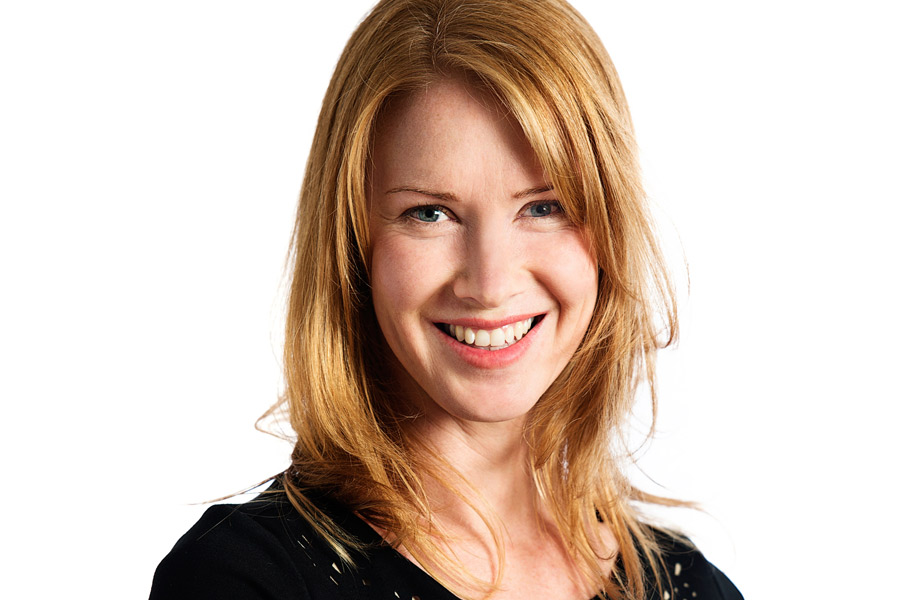I hate that ‘elevator in the morning’ feeling. That feeling you have when you get in that lift ride going to work thinking, ‘here we are’. I hated that feeling when I was in a normal working environment and I knew that’s the thing I wanted to break away from as a culture and a business. I never want myself or anyone working for me to get that sinking feeling when they’re coming to work and I don’t think it breeds innovative thinking.

A self-confessed ‘multipotentialite’, Petrina’s role in her businesses highlights her diverse career background and passion for empathetic creativity. From a background in business development and marketing, Petrina Buckley applies her multi-skilled background to designing training and development courses through Magneto Communications and Credosity. Magneto Communications is a live online and classroom based business-writing organisation taking copyrighting psychology and applying it to business writing training. Credosity meets busy professionals’ demand for just in time learning through real-time analysis of your writing and tailored tips on structure, logic, audience engagement and persuasiveness.
Petrina gives us an overview of how she has built her successful career and the challenges and rewards of having your own business.
Tell us the Petrina story. How did you get to where you are today?
I think about this all the time. There’s a whole language around being an artist versus being an entrepreneur. I think those two worlds are very close to each other and my mind was centred more on being an artist but I’ve always had a big passion for business. I was unfortunately born into a house that didn’t understand what business was and there was no role models but it was something that I clearly had an interest in.
I found my way via art because that was the world I hung out in throughout my 20s with artists, filmmakers and people doing the unconventional. What emerged for me was that I liked to be more in control of the outcome so artistry became entrepreneurialism. After being in the art world you realise how much easier it is to operate in the business world. In the art and entrepreneurial world ambiguity is everywhere. You have theories, passions, interests and intent but the outcome has more ambiguity than you could ever imagine.
I started out in events marketing for nightclubs and that sort of space, which is hilarious given I am the biggest health junkie on earth. I don’t know how I ended up there but quickly went ‘that’s not for me’. I did learn in that space there’s a lot of hustlers. If you want to hang out with a lot of hustlers, go and hang out in the nightclubs space. This was in my early, early 20s. Just hanging around them I learnt a lot about business because I would have to work with the founder, as they’d open up new nightclubs or new hotels that were pretty big scale projects. You saw first hand what it was taking [to build] from the ground up so it was a good learning curve and I think that’s why I hung around because it was so fast paced.
As soon as you’re in hospitality you learn a very fast cadence of delivery on everything. Every night that restaurant is open breakfast, lunch and dinner and there’s events on all the time – there’s no stopping, it’s 24/7 every day of the year, it just keeps rolling and you learn to keep rolling no matter what. As much as I look back at it and go ‘cringe’ at the same time I can get the lessons were around delivery. You had to consistently crank out something new and stepping it up to the next level. It always had to be layer upon layer.
How did you and Paul get the idea to start Magneto Communications?
Magneto started about ten years ago [in] 2005. Paul [Jones] and I had known each other for years but came together when he had a client who booked a training course in three weeks time and Paul hadn’t built the IP yet to deliver the training course but he’d already got the cheque. Paul said ‘I don’t know what to do, I can’t put it together’ and I said ‘I can put it together, that’s exactly what I’ve been doing- I know I can do this. I’ll help you build that first program’. Paul been working for the Australian Institute of Management so it’s not like he hadn’t done it before, he just hadn’t done it for himself though so he hadn’t built his own version.
I remember just lots of pieces of paper out on the unit floor just frantic all night really running up against time and we put it together in the three weeks. The client had already paid, the feedback was fantastic and we went ‘maybe we’ve got a business here’ and really that was it. That’s the exact way you should build a services business – sell first, build the marketing… the one-pager ‘here’s what you’re going to get on the day’ and then build the business. Paul was doing copyrighting at the time and I was doing all sorts of projects – a lot of values exploration workshops for Diabetes Australia and corporate clients so we both kept the day jobs and kept [building] up the business.
Paul also had another business at the time called the Last Thursday Club, a networking group in Sydney and that was just starting to take off as well so I came in and started shaping that into a business. So that’s usually what I do is I come in and create the order and the systems and I’m a bit of an all rounder. We took [the Last Thursday Club] up to the next level over two years. Then we sold it because Magneto had built up. We’d got some great corporate clients, the promise was there and we needed to focus. We got out of the events game but took that learning into our corporate training business.
The 7-year itch…
Fast-forward to 2013/2014…the business had grown and we had a really strong corporate client base. It was a year where we had definitely got the 7-year itch with the business. I think it’s a real thing in relationships and business. It usually comes at 7 or 10 years they say and I think we got it at 7. We went look ‘it’s renovate or detonate’. We knew we wanted to step up to the next level.
We had dabbled in e-learning and online learning and all of it was great but it wasn’t sticking, not just because the business wasn’t sticking but I believed more in just-in-time learning where you work alongside the habit that people already have. That’s how we ended up building Credosity for Microsoft Word because our clients were clearly enterprise and government. That’s who had the pain – managers inside those businesses having to review other peoples’ work or having to just be embarrassed by what was going out on behalf of the business. That’s why they [corporate clients] would come to us to get the training. It was about rethinking learning, identifying existing habits and creating a better learning experience for those existing habits when clients were back at their desks.
What were some of the challenges you faced?
Being a non-technical founder in a technology company, it’s been a disadvantage and an advantage. The disadvantage is you are reliant on getting incredible people around you that know the technology and you can trust to make incredibly built to last decisions.
Enterprise software is tough,anyone will say that. Getting that right and developing it in a way that is built to last that can keep up in very rapidly changing landscape [is challenging]. It’s never been a better time to be building on Microsoft.
Rewind two years ago and people would say ‘Microsoft? There’s so many other cool options out there’. Now I think those people have very rapidly been proven wrong because Microsoft has an incredible pace to it now that was never there two and a half to three years ago. The disadvantage is making sure you understand the technology and you’re focused in the right way. I now know more about enterprise deployment than I ever thought.
The upside is I’m more people focused than technology focused; it’s a huge advantage because smart human software cannot be developed without the empathy piece, without the people piece. That’s what we found, a lot of the solutions out there we would look at them and go ‘that’s just developed by developers for developers and no human could look at this and make sense of it’. It was either too much or too technical and it didn’t have the type of design thinking I can appreciate. I was just seeing something that your average user in a corporate, the type of person we’re trying to help, would open it and go ‘this is not for me’. It was overwhelming and confusing.
We wanted to use the people side as being the advantage of having no idea about the tech. I now know things I never thought I would know or needed to know but apparently I know way more than I thought I could ever imagine about enterprise deployment. You want people to be using it so you have to work through all the roadblocks and build your own knowledge until you understand it so it was a huge learning curve.
And the Rewards…
Many many many! Financial reward is the one that people think ‘that’s going to be the reward’ and it will fix nothing. I’ve had some extreme first hand experience of that not fixing a thing for a friend who has got plenty of it. I can think of two guys who I’ve been particularly close with, one was someone I worked with and the other a close friend. I just got some up close and personal experience with the hell they were in thinking that was going to be the important one. I had the benefit of learning from their mistakes and I know not to pursue that. I shift that [focus] in my head and we’re always making investments so I want a healthy profitable business and I never want that to change because I think that’s what’s sustainable.
Beyond that what I think you get as the biggest reward has been the personal learning and the opportunity and freedom when you get an idea and you can actually implement that idea. You go ‘I actually think we should go do this’ and you don’t have to check that off with anybody else or I don’t have to write a board paper. There’s no red tape, there’s just go, and I love that freedom. Sometimes I don’t acknowledge that as much as I should and go ‘that’s pretty cool’. There’s no handbrake I hate handbrakes and I hate people who are handbrakes too, unless it’s sensible. I don’t like the emotional handbrake or the real world handbrake and I think that’s what a lot of entrepreneurs will tell you too. I go ‘we’ve got to step on the gas over here and even if I slam into the wall that’s okay, I’ll own it.’
How do you stay focused?
The biggest thing I ever did and this was a long time ago, probably 12 years ago, I got really clear about my values and articulated those. They’ve changed a few times as I’ve understood myself better. Working that out and actually knowing for you ‘these are my unshakable, don’t mess with me, don’t cross the line parts of my life’ will help make and shape your decisions.
My three fundamental values that I keep coming back to are health, family and business in that order. If things are wobbly, you have to come back to the moment and assess where your core values are at seeing if you’ve let anything ago and being able to turn that into action the next day. I’ll ask myself have I exercised this week? Are we having enough family time? Where are we at? What do we need to do?
And being clear that business is number three and keeping that in perspective. I’m borderline workaholic and I love to work.
What is the future for Magneto and Credosity?
That Magneto becomes the enterprise communication standard and we are a model that is best practice. When someone sits down to write something important or wants to evolve their communication skills, they turn to Credosity as a source of learning and trusted advisor to help them.
What advice would you give to your younger self?
- Don’t wait for permission.
- Follow and trust your instinct.
- Don’t worry about what everyone else says.
- Worry about what’s right for you, not what is right for the rest of the world.
- Hurry up!
- Know yourself; know that you’re worth it.
- Get going and don’t look back.
Thanks to Petrina for sharing her insights with Leaders in Heels!
Images via Petrina Buckley.
Nicola Smith
Nicola Smith is a research and policy analyst with experience in the property and technology industries. Nicola is eager to learn and thrives on intellectual challenge ensuring this translates into informative content for Leaders in Heels’ readers. Her goal- to create the informative career content that you’re grateful to receive from a mentor, colleague or friend.


